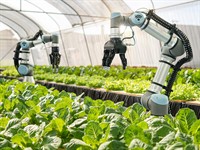PIRMĀ SEMESTRA NOSLĒGUMA TESTI
Read the text and answer the questions below.

The World in 2035: How AI, Robotics, and Smart Cities Will Redefine Life
(1) By 2035, the combination of artificial intelligence (AI), robotics, and smart city systems is expected to change daily life completely. From how we work to how we interact with our surroundings, these new technologies will shape a world that is more efficient, better connected, and, some say, even more human.
(2) One of the most important changes will happen in city transport. Self-driving cars and AI traffic control will reduce traffic jams and pollution. Traffic lights may become outdated as sensors and AI control vehicle movement more smoothly than people ever could. Supporters say these ideas could reduce travel-to-work times, but critics worry that we might depend too much on systems that could stop working or be easy to attack by hackers.
(3) Robotics will also change the job market. Repetitive and dangerous tasks in industries like manufacturing, farming, and delivery will more often be given to smart machines. While this change could raise productivity and make work safer, it also brings fears of large-scale job loss. Economists disagree: some believe new jobs will appear, while others warn that automation might go faster than society can adjust.
(4) Healthcare will also change greatly. AI medical tools and robotic surgeries promise earlier finding of diseases and greater accuracy. In smart cities, wearable health devices could track people’s vital signs in real time and alert doctors before an emergency happens. Yet, moral questions about data privacy and monitoring are becoming more serious. Are we ready to live in a world where every heartbeat could be watched?
(5) Supporters of smart cities believe that these technologies will improve sustainability and strength. AI-controlled energy networks, waste-reducing smart homes, and buildings that respond to climate changes could greatly reduce pollution. However, critics say such progress might increase the gap between rich and poor, leaving out people who are less connected.
(6) Overall, the discussion about AI, robotics, and smart cities moves between hope and worry. While the possible benefits are great, the social, moral, and economic effects must not be ignored. As we move toward 2035, the biggest challenge may not be technological progress itself, but making sure it is fair and includes everyone.
(1) By 2035, the combination of artificial intelligence (AI), robotics, and smart city systems is expected to change daily life completely. From how we work to how we interact with our surroundings, these new technologies will shape a world that is more efficient, better connected, and, some say, even more human.
(2) One of the most important changes will happen in city transport. Self-driving cars and AI traffic control will reduce traffic jams and pollution. Traffic lights may become outdated as sensors and AI control vehicle movement more smoothly than people ever could. Supporters say these ideas could reduce travel-to-work times, but critics worry that we might depend too much on systems that could stop working or be easy to attack by hackers.
(3) Robotics will also change the job market. Repetitive and dangerous tasks in industries like manufacturing, farming, and delivery will more often be given to smart machines. While this change could raise productivity and make work safer, it also brings fears of large-scale job loss. Economists disagree: some believe new jobs will appear, while others warn that automation might go faster than society can adjust.
(4) Healthcare will also change greatly. AI medical tools and robotic surgeries promise earlier finding of diseases and greater accuracy. In smart cities, wearable health devices could track people’s vital signs in real time and alert doctors before an emergency happens. Yet, moral questions about data privacy and monitoring are becoming more serious. Are we ready to live in a world where every heartbeat could be watched?
(5) Supporters of smart cities believe that these technologies will improve sustainability and strength. AI-controlled energy networks, waste-reducing smart homes, and buildings that respond to climate changes could greatly reduce pollution. However, critics say such progress might increase the gap between rich and poor, leaving out people who are less connected.
(6) Overall, the discussion about AI, robotics, and smart cities moves between hope and worry. While the possible benefits are great, the social, moral, and economic effects must not be ignored. As we move toward 2035, the biggest challenge may not be technological progress itself, but making sure it is fair and includes everyone.
1. Which paragraph supports the claim that technology can improve safety?
2. What is the effect of the phrase “change daily life completely” in the introduction?
3. What does the phrase “the biggest challenge... making sure it is fair and includes everyone” imply?
Lai iesniegtu atbildi un redzētu rezultātus, Tev nepieciešams autorizēties. Lūdzu, ielogojies savā profilā vai reģistrējies portālā!